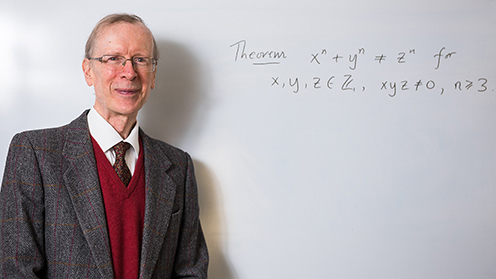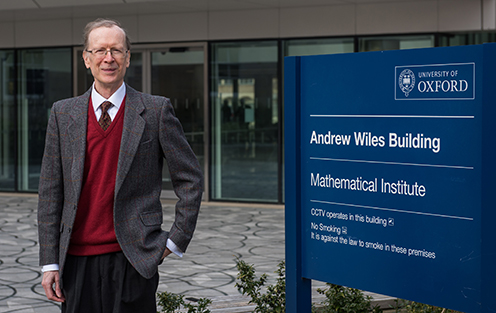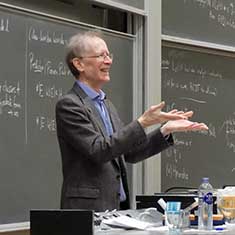Harald Bohr Foredrag ved Sir Andrew Wiles
Institut for Matematiske Fag er meget stolt over at kunne annoncere Sir Andrew Wiles, Royal Society Research Professor ved Oxford Universitet, som den næste Harald Bohr forelæser. Hans forelæsning "Rational points on elliptic curves" vil finde sted onsdag d. 14. marts kl. 15:15 i Auditorium 1.

Sir Andrew Wiles. Foto: www.johncairns.co.uk
Sir Andrew Wiles beskriver sin forelæsning som "a survey of the progress on finding and describing the rational points on elliptic curves". Denne særlige begivenhed markerer også genoplivningen af Abelpris forelæsningsrækken arrangeret sammen med Dansk Matematisk Forening.
Det Norske Videnskaps-Akademi tildelte Sir Andrew Wiles Abelprisen i 2016 for "his stunning proof of Fermat’s Last Theorem by way of the modularity conjecture for semistable elliptic curves, opening a new era in number theory".
Andrew Wiles blev først opmærksom på Fermat's sidste sætning som dreng: "I grew up in Cambridge, and my love of mathematics dates from those early childhood days. I loved doing problems in school. I'd take them home and make up new ones of my own. But the best problem I ever found, I found in my local public library. I was just browsing through the section of math books and I found this one book, which was all about one particular problem—Fermat's Last Theorem. This problem had been unsolved by mathematicians for 300 years. It looked so simple, and yet all the great mathematicians in history couldn't solve it. Here was a problem, that I, a 10-year-old, could understand, and I knew from that moment that I would never let it go. I had to solve it."
"This was my childhood passion. There’s nothing to replace that. I had this very rare privilege of being able to pursue in my adult life what had been my childhood dream. I know it’s a rare privilege, but if you can tackle something in adult life that means that much to you, then it’s more rewarding than anything imaginable."
"Fermat’s Last Theorem, first formulated by Pierre de Fermat in the 17th century, is the assertion that the equation x^n + y^n = z^n has no solutions in positive integers for n>2. Fermat proved his claim for n=4, Leonhard Euler found a proof for n=3, and Sophie Germain proved the first general result that applies to infinitely many prime exponents. Ernst Kummer’s study of the problem unveiled several basic notions in algebraic number theory, such as ideal numbers and the subtleties of unique factorization. The complete proof found by Andrew Wiles relies on three further concepts in number theory, namely elliptic curves, modular forms, and Galois representations." (Uddrag fra Abel-komiteens begrundelse).
Andrew Wiles studerede matematik i Oxford, og opnåede en bachelor grad i 1974 fra Merton College. Et år senere blev han optaget på Clare College i Cambridge, hvor han forfulgte ph.d.-graden under vejledning af John Coates, som arbejdede med Iwasawa teorien for elliptiske kurver. Fra 1977 til 1980 var Wiles Junior Research fellow ved Clare College i Cambridge, og også Benjamin Pierce Assistant Professor ved Harvard University. Han opnåede phd graden i 1980: hans phd afhandling omhandlede et andet berømt problem, formodningen af Birch og Swinnerton-Dyer. Han blev professor ved Princeton Universitet i 1982, hvor han blev i næsten 30 år. Han blev forfremmet til Eugene Higgins Professor of Mathematics i 1994. Det følgende år blev hans artikel Modular elliptic curves and Fermat's Last Theorem optaget i Annals of Mathematics. Han flyttede til Oxford i 2011 som Royal Society Research Professor.

Andrew Wiles foran Matematisk Institut på Oxford Universitet og bygningen, der er opkaldt efter ham. Foto: www.johncairns.co.uk
Andrew Wiles har modtaget adskillige priser og hædersbevisninger for sit enestående arbejde, beskrevet som "one of the greatest triumphs of contemporary mathematics" og "a monument to individual perseverance" herunder Fermat Prize (1995), Ostrowski Prize (1995), Cole Prize (1996), Wolf Prize (1995/96), Royal Medal of the Royal Society (1996) og Wolfskehl Prize (1997). I 1998 tildelte International Mathematical Union ham en sølvplade ved International Congress of Mathematicians i Berlin, idet han ikke kunne tildeles Fields medaljen, da han var fyldt 40 år. I 1989 blev han Fellow of the Royal Society og i 1996 blev han udenlandsk medlem af det amerikanske National Academy of Science. I 2000 blev han slået til ridder af dronningen af England. Sir Wiles har også modtaget Shaw Prize (2005) og Copley Medal 2017 of the Royal Society, foruden Abelprisen (2016).
"I want people to think of mathematics as this beautiful edifice which is immutable, the most permanent thing there is, besides it being tremendously useful, since it is the language of science." (Oxford Mathematics London Public Lecture - Andrew Wiles in conversation with Hannah Fry, December 2017).
Magdalena Musat
Mere om Sir Andrew Wiles
- Ad Honorem: Sir Andrew J. Wiles, Notices of the American Mathematical Society, March 2017, Vol 64, Issue 03
- Se fotos fra foredraget
Harald Bohr Lectures

Harald Bohr foredragsrækken er opkaldt efter den fornemme danske matematiker Harald Bohr (1887-1951), for at ære hans arv som en eminent og passioneret formidler af matematik. Foredragsholderne er fremragende matematikere fra både ren og anvendt matematik.
Foredragene afholdes 1-3 gange om året, alle er velkomne. Harald Bohr foredragsrækken er arrangeret af Magdalena Musat.

